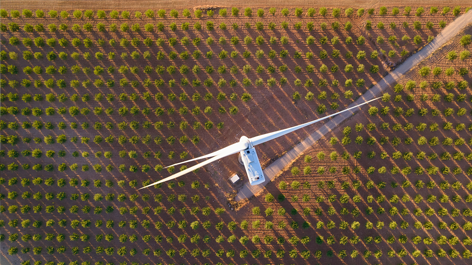Environmental impact
In response to the climate emergency, our approach sets out to ensure the rapid implementation and rollout of measures designed to mitigate and adapt to the already tangible environmental and socio-economic impacts of climate change and biodiversity loss. Making the impact accessible to all means raising awareness and providing extensive support to our clients in the environmental transition by providing them with expertise, advisory services, and comprehensive solutions.
Basing its activities on scenarios defined by science, Groupe BPCE and its business lines position themselves as facilitators of transition efforts in pursuit of a clear and ambitious objective: to finance a carbon-neutral economy by 2050 by taking action today.


Impact solutions
Our approach sets out to ensure the rapid implementation and rollout of measures designed to mitigate and adapt to environmental and socio-economic impacts. It is based on Groupe BPCE’s cooperative business model: a strong presence in local communities and an active commitment to society geared to financing the French economy.

For our individual clients : providing support for energy renovations and home adaptations addressing aging and reduced autonomy by offering financing solutions and by mobilizing our role as a housing operator, trusted third party along with our network of partnerships:
- By offering an “advice and sustainable solutions” tool in partnership with ADEME (French Environmental and Energy Management Agency), making it easy for clients to calculate their carbon footprint but also to benefit from advice and assistance for energy renovation work, for decarbonized mobility or green investments.
- By providing support at each stage of energy renovation projects for individual homes and condominiums: energy assessment, search for grants, guarantee of successful completion of works, with pathways and financing tailored to each situation.
- By increasing the number of financing solutions for the energy efficiency renovation of buildings.
Transitioning the business models of our business clients, ranging from SMEs to the largest international companies: The Group engages with its clients through dedicated dialogue and sector-specific expertise to integrate ESG issues according to the size of the companies and their economic sectors, particularly in energy infrastructure, transportation, waste management and treatment, etc.
Sustainable solutions also exist for investor clients with a range of responsible investments and financial products: sustainable development passbook savings accounts, funds with sustainable investment targets, theme-based accredited funds, etc.


Supporting improvements in the energy mix
Convinced that speeding up the advent of a sustainable energy system should be given priority status in response to the urgent climate crisis, Groupe BPCE is fully committed to the energy transition, particularly in the development of renewable and low-carbon energies, both in France and in the parts of the world where the Group does business:
- By positioning itself among the global leaders in the debt financing of projects in the renewable energies sector
- By increasing its dedicated financing for the production and storage of green electricity
- By providing advice about capital raising processes to its clients commanding leading positions in the infrastructure and equipment sector related to energy transition as well as innovative and high-growth companies in the same sector
- By providing its clients pursuing energy transformation projects with consultancy services related to their financing or capital raising processes
- By supporting the reindustrialization of local and regional France and promoting energy sovereignty
- By setting up teams of experts dedicated to low-carbon energies (solar, wind, electrolysis, etc.) and critical metals.
+ 15 % Goal of the Vision 2030 strategic project for financing renewable energies
Management decarbonization trajectories
We are committed to aligning our financing portfolios with a carbon-neutral trajectory, setting short, medium, and long-term targets to achieve these ambitious goals.

In order to limit the climate impact of our financing, investment, and insurance activities, and gradually to align our portfolios with a “Net Zero” trajectory, we are pursuing the following initiatives:
- The development of carbon emission measurement systems and the management of the climate trajectory of all the Group’s portfolios. Groupe BPCE completed in 2023 and 2024 the process first launched in 2022 in the electricity generation, oil and gas sectors, and has now published a decarbonization objective covering the eleven highest carbon-emitting sectors.
- The development of our system for identifying and managing physical and transitional climate risks affecting both our clients and our own activities, on the basis of a continuous improvement approach.
- The withdrawal from the most carbon-emitting activities through appropriate CSR policies.
Definition of a biodiversity strategy
One million animal and plant species are liable to disappear in the coming decades if no measures are taken to curb this trend, warns the Intergovernmental Science-Policy Platform on Biodiversity and Ecosystem Services (IPBES). This represents a major challenge for the economy: according to the World Economic Forum, over 50% of global GDP depends on nature and the services it provides.

Aware that it cannot act alone in the face of this challenge, Groupe BPCE has joined several locally based and global coalitions, as act4nature international. Determined to act in favor of biodiversity, the Group is working to reduce the pressures on nature and gradually make this dimension an integral part of its activities.
In the publication Acting for Nature, the Groupe BPCE outlines its priority actions aimed at contributing to biodiversity protection and its approach to addressing deforestation challenges.
Furthermore, Groupe BPCE has launched a series of local and regional initiatives for the protection of the natural heritage with a goal, included in the Vision 2030 strategic project, to protect more than 30 natural ecosystems.
Active and innovative issuer of sustainable funding instruments
In its Vision 2030 strategic project, the Group has set itself the target of issuing more than five green, social or health funding instruments per year, using all the different debt instruments at its disposal. These issuances are part of the BPCE’s “Green Funding Framework” and “Social Funding Framework” available from the Group’s institutional investor website.
+5 funding issuances The Group has set itself the target of completing more than five green, social or health funding issuances per year.